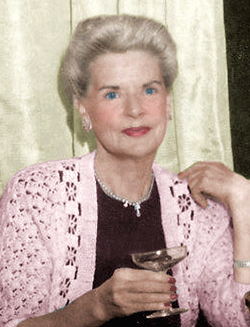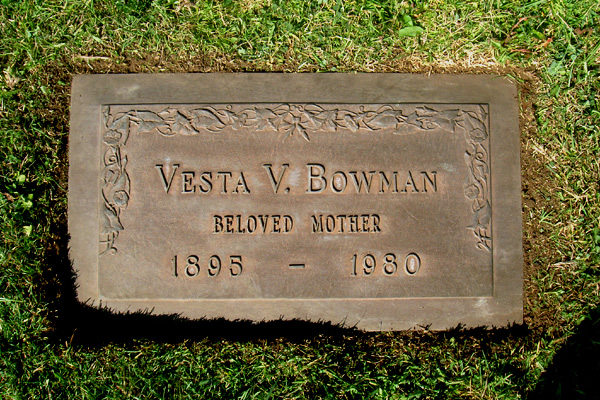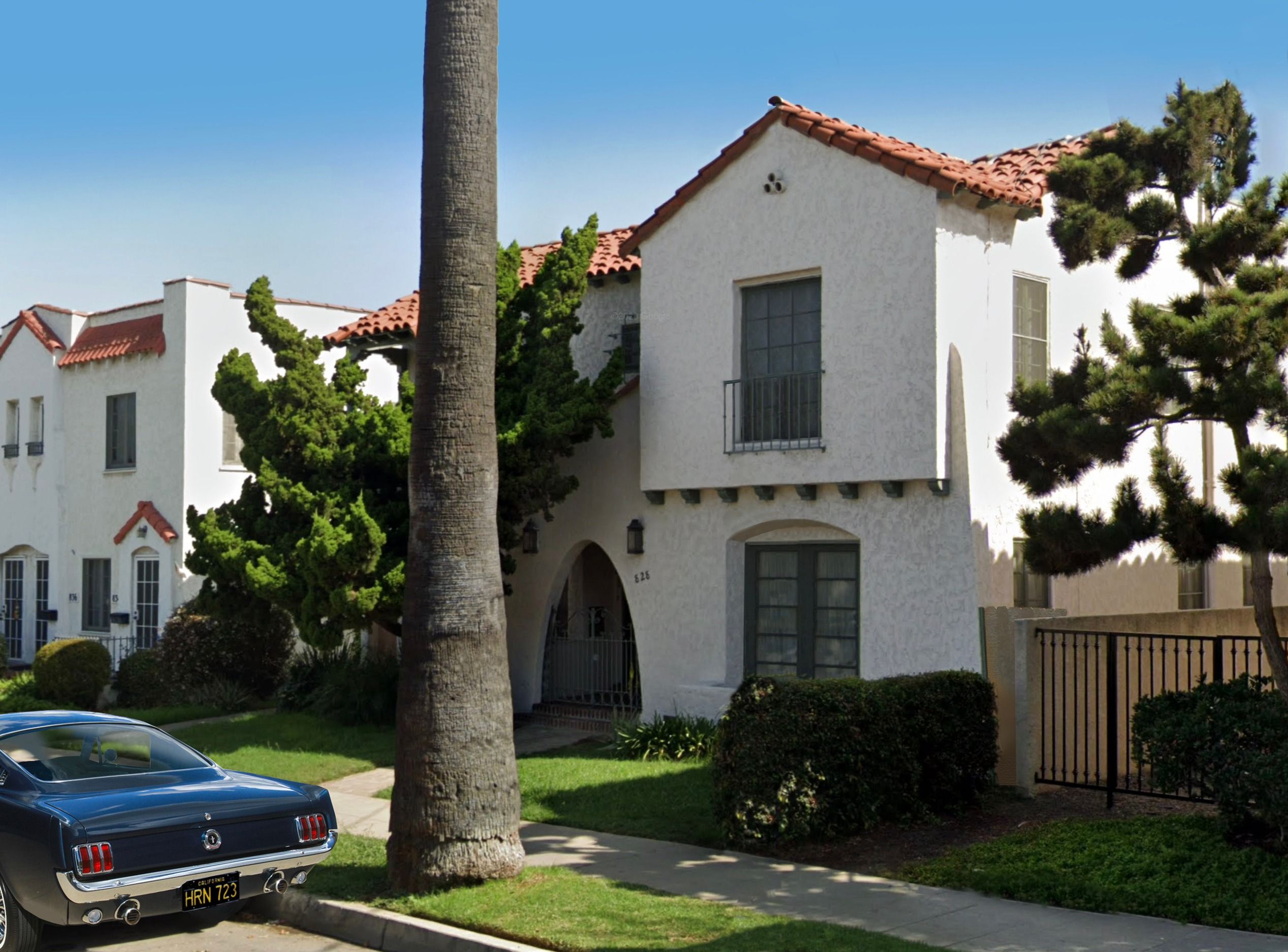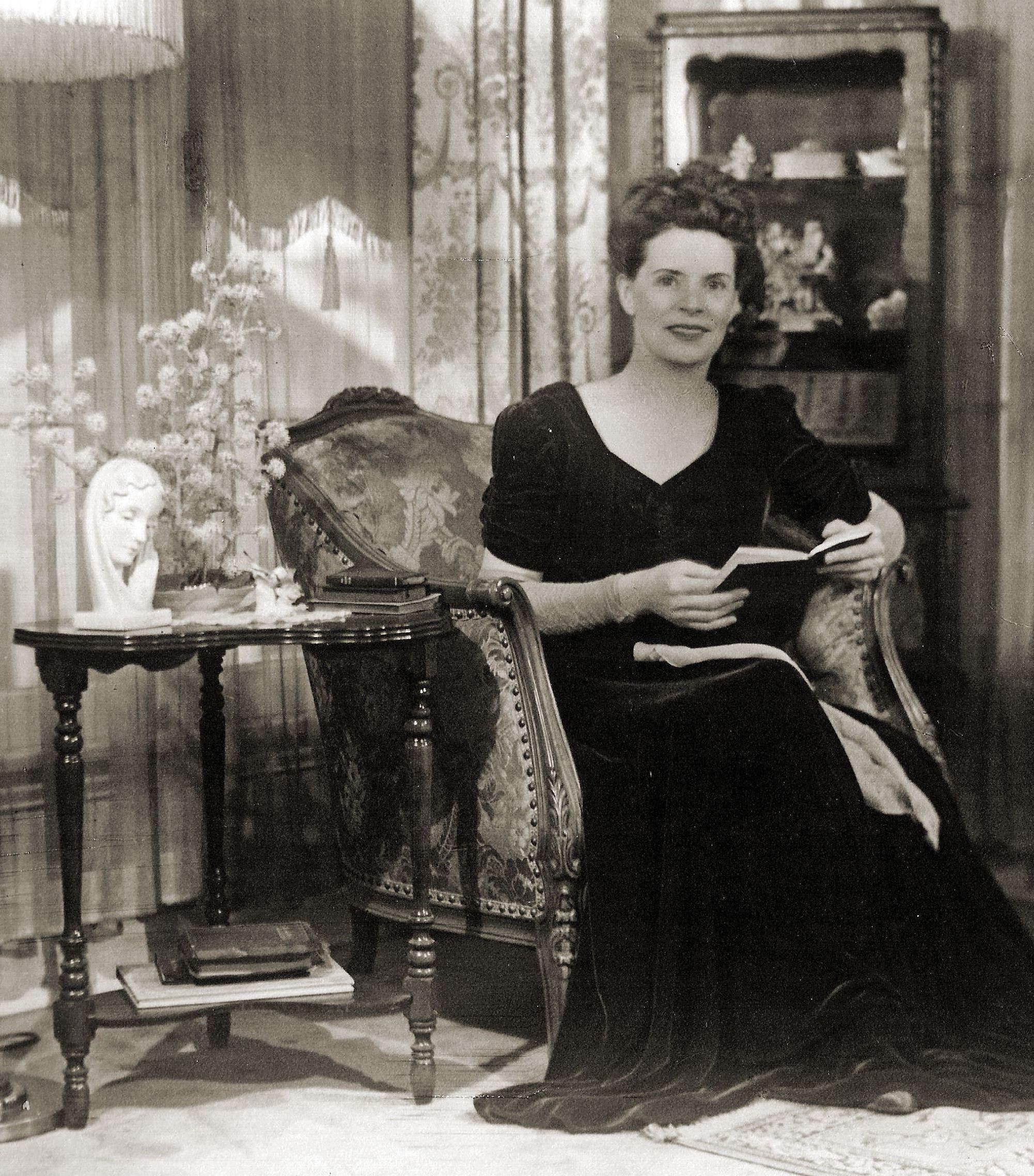As a young woman, she fell in love and married Rawley David Bowman, a handsome young Virginia feed store clerk, and the couple soon had a baby Raymond DeArmond Bowman. In 1920 they moved west to Long Beach, California. At her suggestion, her husband changed the spelling of his name to the more elegant "Raleigh" and took a job on the "Red Car Line" as a conductor. He wrote many poems observing his life in Virginia, the Civil War, her blue eyes, and patriotic themes.
She turned to raising her son and became interested in local society and educated herself in classical music, the arts and local history. She enjoyed the symphony concerts at the civic auditorium, which she found elegant and magical. Though her husband was a quiet man who enjoyed the simplicity of the home, she had her son Raymond learn the violin and he was to become the central figure of her attention. Her son became a child prodigy, lighting up the concert hall with his playing. Vesta herself was an active member of the "Polyphonic Singers".
In a very short time, she became a founding member of the Long Beach Women's Committee for the Philharmonic Orchestra of Southern California and was to appear many times in the Long Beach "society" column of the newspaper for the next 30 years or so. The new Long Beach auditorium and concert hall was soon finished, and her volunteer work with the Symphony Committee increased. She was seen at all the concerts during that time, having organized many receptions and parties for composers, conductors and guest artists.
Disaster struck in 1933, when the great earthquake of Long Beach ruined their home on Loma Avenue, but Vesta would not be depressed or defeated. She rolled up her sleeves and quickly set up a soup kitchen on their front lawn and served many hot meals to the neighborhood families who were displaced.
In 1939, her son Raymond joined the National Guard and would soon find himself in the regular Army just in time to be stationed on the island of Hawaii during the Pearl Harbor Attack on December 7, 1941. He survived and was to stay in the Army and reserves for the next 17 years.
During World War 2 she served as the President of the Long Beach Women's Committee for the Philharmonic Orchestra. She organized many fund raisers and galas bringing the Los Angeles Philharmonic Orchestra to Long Beach and bringing Long Beach society to the Los Angeles Philharmonic Hall and Hollywood Bowl venues. One of her passions were the "Children's Concerts" which she helped organize. In 1941, she is quoted as saying "The Children's Concerts are the chief interest of this group of women".
Quietly her husband Raleigh died in 1955 and Vesta moved into an apartment at 828 Termino Avenue. In 1957, Vesta bought a business called "Universal News" in downtown Long Beach, which sold out-of-town newspapers. The address was at the Ocean Center Building, but she moved it across the street to the Jergens Trust (State Theater) building at 34 South Pine. She developed an affection for a man named Isaac Newton Colebank (1895-1970) and he worked with her in the shop without pay, because he enjoyed being with her so much. They were never to marry or live together, but Vesta and "Colby" (as he was affectionately called) became inseparable and enjoyed "visiting" with their many loyal customers who bought out-of-town newspapers at her shop. Colby would open the store at 10:00 a.m. and Vesta would bring a lunch she prepared around noon they both shared. The shop closed at 5 p.m.then they would dine at a restaurant downtown, mainly the old "Mannings Cafeteria" on Pine Ave., the "Bit of Sweden", or the "Crown Cafeteria" at 101 Alamitos Ave. On special nights they might be seen at the Breakers Hotel on the waterfront.
She rarely had anything negative to say about anyone, had a great sense of humor and a fantastic laugh. She had many friends downtown and every shop owner knew her and remembered her warm smile, champagne hued blonde hair and the scent of her Coty Emeraude perfume. She was sent countless cards every Christmas and took pride in responding to each one, writing beautifully penned letters of thanks. She loved the colors of soft pink, lavender and dusty rose.
In 1962 Vesta became a grandmother when her son Raymond and his new wife Lita gave birth to a son they named Raymond Jr.
Lita had been married before and Vesta instantly inherited 2 older grandchildren, Christian (me) and Leslie who she adored. These were very happy years, as she was able to enjoy the company of children for the first time in many years. This was the year she also bought a new automobile... a 1962 Dodge Dart, in 2-tone tan and light brown. She was very proud of it and had it washed and cared for often. The car looked new for the next 18 years she owned it.
Vesta adored President Kennedy and First Lady Jacqueline. She loved their style, class, and that they restored the White House to it's originial glory. When the President was killed on November 1963, Vesta weeped for days after.
In 1965 Vesta and Mr. Colebank took 2 weeks off to visit Hawaii, and she returned with a bounty of gifts for her friends and family. On her own, she made several trips to Virginia to visit relatives and to West Virginia to stay at the opulent Greenbrier Hotel to enjoy the gardens and to fulfill a childhood fantasy to one day stay at the majestic resort.
She closed her business in 1967 after Mr. Colebank had a stroke and heart attack. He was to enter a retirement home because he could no longer take care of himself. Every day until his death in 1970, unselfishly, she would spend an hour or two with him at his retirement home, bringing him gifts, or a desert she made. In 1976 she began to show signs of Alzheimer's disease and in 1979 was admitted to a retirement home herself. She died in 1980 at the age of 85 soon after a fall where she broke her hip. She was a strong, independent, creative, yet very feminine woman who earned the respect of many during her lifetime. She is dearly missed by many people to this day.
She was interred in Redondo Beach since her son was living there at that time and could visit her grave often. She was buried dressed in pink satin, in a pink casket with pink lining, and even her grave stone is pink.
A personal note: Vesta was one of the most influential people in my life. I learned a great deal about life and following my passions from this amazing woman. I miss her dearly. To this day, I keep some of her precious possessions preserved. In one of her letters she wrote "Live your life with class and dignity and others will start treating you that way". She was right. - Christian
As a young woman, she fell in love and married Rawley David Bowman, a handsome young Virginia feed store clerk, and the couple soon had a baby Raymond DeArmond Bowman. In 1920 they moved west to Long Beach, California. At her suggestion, her husband changed the spelling of his name to the more elegant "Raleigh" and took a job on the "Red Car Line" as a conductor. He wrote many poems observing his life in Virginia, the Civil War, her blue eyes, and patriotic themes.
She turned to raising her son and became interested in local society and educated herself in classical music, the arts and local history. She enjoyed the symphony concerts at the civic auditorium, which she found elegant and magical. Though her husband was a quiet man who enjoyed the simplicity of the home, she had her son Raymond learn the violin and he was to become the central figure of her attention. Her son became a child prodigy, lighting up the concert hall with his playing. Vesta herself was an active member of the "Polyphonic Singers".
In a very short time, she became a founding member of the Long Beach Women's Committee for the Philharmonic Orchestra of Southern California and was to appear many times in the Long Beach "society" column of the newspaper for the next 30 years or so. The new Long Beach auditorium and concert hall was soon finished, and her volunteer work with the Symphony Committee increased. She was seen at all the concerts during that time, having organized many receptions and parties for composers, conductors and guest artists.
Disaster struck in 1933, when the great earthquake of Long Beach ruined their home on Loma Avenue, but Vesta would not be depressed or defeated. She rolled up her sleeves and quickly set up a soup kitchen on their front lawn and served many hot meals to the neighborhood families who were displaced.
In 1939, her son Raymond joined the National Guard and would soon find himself in the regular Army just in time to be stationed on the island of Hawaii during the Pearl Harbor Attack on December 7, 1941. He survived and was to stay in the Army and reserves for the next 17 years.
During World War 2 she served as the President of the Long Beach Women's Committee for the Philharmonic Orchestra. She organized many fund raisers and galas bringing the Los Angeles Philharmonic Orchestra to Long Beach and bringing Long Beach society to the Los Angeles Philharmonic Hall and Hollywood Bowl venues. One of her passions were the "Children's Concerts" which she helped organize. In 1941, she is quoted as saying "The Children's Concerts are the chief interest of this group of women".
Quietly her husband Raleigh died in 1955 and Vesta moved into an apartment at 828 Termino Avenue. In 1957, Vesta bought a business called "Universal News" in downtown Long Beach, which sold out-of-town newspapers. The address was at the Ocean Center Building, but she moved it across the street to the Jergens Trust (State Theater) building at 34 South Pine. She developed an affection for a man named Isaac Newton Colebank (1895-1970) and he worked with her in the shop without pay, because he enjoyed being with her so much. They were never to marry or live together, but Vesta and "Colby" (as he was affectionately called) became inseparable and enjoyed "visiting" with their many loyal customers who bought out-of-town newspapers at her shop. Colby would open the store at 10:00 a.m. and Vesta would bring a lunch she prepared around noon they both shared. The shop closed at 5 p.m.then they would dine at a restaurant downtown, mainly the old "Mannings Cafeteria" on Pine Ave., the "Bit of Sweden", or the "Crown Cafeteria" at 101 Alamitos Ave. On special nights they might be seen at the Breakers Hotel on the waterfront.
She rarely had anything negative to say about anyone, had a great sense of humor and a fantastic laugh. She had many friends downtown and every shop owner knew her and remembered her warm smile, champagne hued blonde hair and the scent of her Coty Emeraude perfume. She was sent countless cards every Christmas and took pride in responding to each one, writing beautifully penned letters of thanks. She loved the colors of soft pink, lavender and dusty rose.
In 1962 Vesta became a grandmother when her son Raymond and his new wife Lita gave birth to a son they named Raymond Jr.
Lita had been married before and Vesta instantly inherited 2 older grandchildren, Christian (me) and Leslie who she adored. These were very happy years, as she was able to enjoy the company of children for the first time in many years. This was the year she also bought a new automobile... a 1962 Dodge Dart, in 2-tone tan and light brown. She was very proud of it and had it washed and cared for often. The car looked new for the next 18 years she owned it.
Vesta adored President Kennedy and First Lady Jacqueline. She loved their style, class, and that they restored the White House to it's originial glory. When the President was killed on November 1963, Vesta weeped for days after.
In 1965 Vesta and Mr. Colebank took 2 weeks off to visit Hawaii, and she returned with a bounty of gifts for her friends and family. On her own, she made several trips to Virginia to visit relatives and to West Virginia to stay at the opulent Greenbrier Hotel to enjoy the gardens and to fulfill a childhood fantasy to one day stay at the majestic resort.
She closed her business in 1967 after Mr. Colebank had a stroke and heart attack. He was to enter a retirement home because he could no longer take care of himself. Every day until his death in 1970, unselfishly, she would spend an hour or two with him at his retirement home, bringing him gifts, or a desert she made. In 1976 she began to show signs of Alzheimer's disease and in 1979 was admitted to a retirement home herself. She died in 1980 at the age of 85 soon after a fall where she broke her hip. She was a strong, independent, creative, yet very feminine woman who earned the respect of many during her lifetime. She is dearly missed by many people to this day.
She was interred in Redondo Beach since her son was living there at that time and could visit her grave often. She was buried dressed in pink satin, in a pink casket with pink lining, and even her grave stone is pink.
A personal note: Vesta was one of the most influential people in my life. I learned a great deal about life and following my passions from this amazing woman. I miss her dearly. To this day, I keep some of her precious possessions preserved. In one of her letters she wrote "Live your life with class and dignity and others will start treating you that way". She was right. - Christian
Inscription
VESTA V. BOWMAN
BELOVED MOTHER
1895 --- 1980











